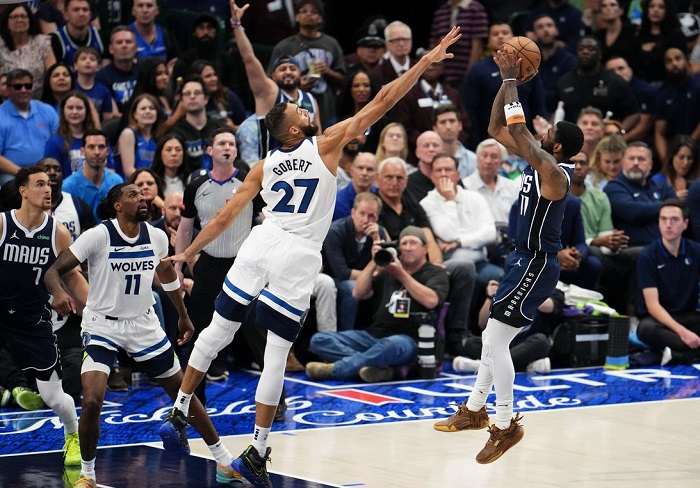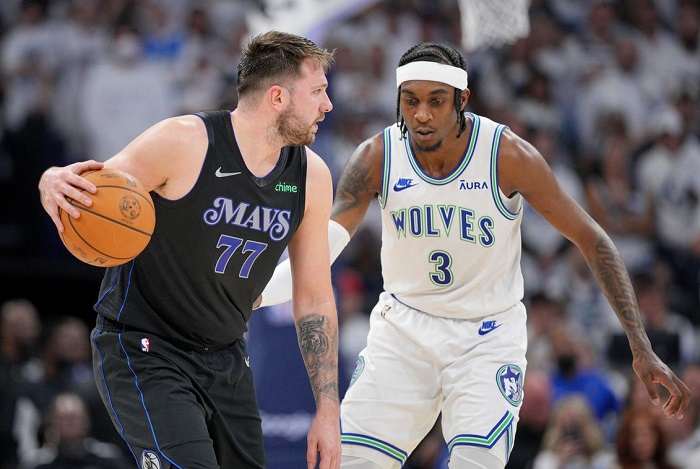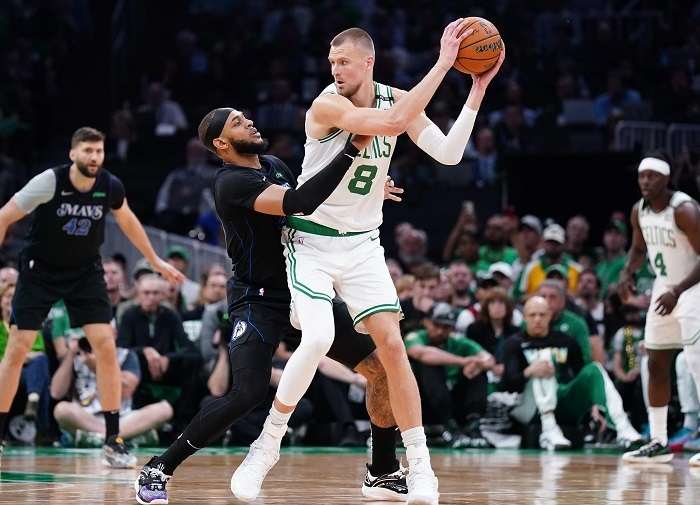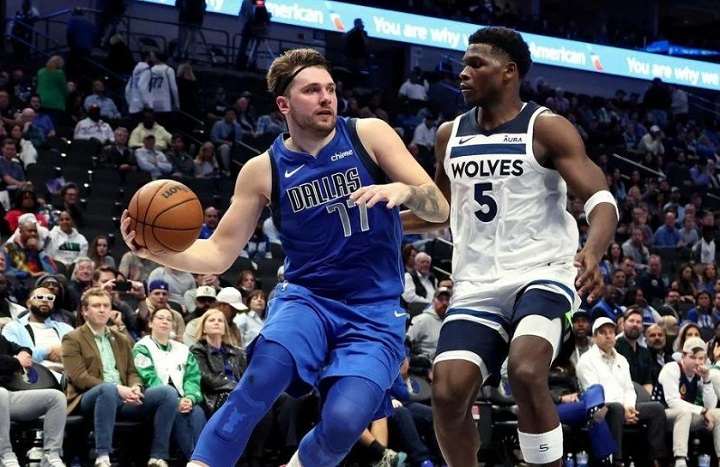Introduction to the Match

The Dallas Mavericks, led by Luka Dončić, have established themselves as one of the most dynamic teams in the Western Conference. Known for their fast-paced offense and strategic plays, they have a roster filled with both seasoned veterans and emerging stars. The Minnesota Timberwolves, on the other hand, have been rebuilding over the last few seasons, with Anthony Edwards and Karl-Anthony Towns leading the charge for the young team. This matchup between the Mavericks and the Timberwolves promised excitement and delivered a battle between two teams hungry for playoff contention.
In this article, we’ll explore the key player performances, compare stats, and assess how each player contributed to their team’s success (or failure) in the game. For the purpose of clarity and in-depth understanding, we’ll break down the match into specific areas like scoring, defense, rebounds, assists, and clutch moments.
Scoring Leaders: Mavericks and Timberwolves’ Key Performers
Luka Dončić: The Offensive Maestro
When talking about the Dallas Mavericks, Luka Dončić is often the first name that comes to mind, and rightly so. Dončić has consistently proven himself as one of the league’s premier scorers and playmakers. In this particular game, he was no different, leading the Mavericks’ charge with a high scoring output. Luka ended the game with 35 points, shooting 52% from the field and 40% from beyond the arc. His versatility on offense was on full display as he alternated between driving to the basket, creating his own shots, and dishing out pinpoint passes to his teammates.
Dončić’s ability to manipulate defenses with his size, skill, and basketball IQ was evident. He continuously attacked mismatches, particularly exploiting the Timberwolves’ perimeter defense. His footwork in the post allowed him to back down smaller defenders, and his range made him a constant threat beyond the three-point line. Luka’s midrange game was also clicking, shooting 70% on midrange attempts. In the fourth quarter, Dončić scored 12 of his 35 points, keeping the Mavericks within striking distance as the Timberwolves pulled away.
Anthony Edwards: The Ascending Star
On the other side of the court, Anthony Edwards shined for the Timberwolves. Edwards has shown flashes of brilliance throughout his young career, and this game was no exception. The high-flying guard had a game-high 40 points, showing his impressive scoring prowess. Edwards was aggressive from the opening tip, attacking the rim relentlessly and finishing through contact. He shot 45% from the field, but what stood out was his 9-for-12 shooting at the free-throw line, reflecting his ability to draw fouls and earn points from the stripe.
Edwards’ three-point shooting was also on point, going 4-for-9 from beyond the arc. His shooting range forced the Mavericks’ defenders to play him tighter, which opened up driving lanes for him to exploit. He showed an improved mid-range game, utilizing step-backs and fadeaways when the lane was clogged. His clutch shooting in the final minutes helped secure the win for the Timberwolves, as he scored 8 points in the last two minutes to seal the game.
Role Players Stepping Up: Tim Hardaway Jr. and Karl-Anthony Towns
While Dončić and Edwards dominated the scoring, other players were crucial to their teams’ offensive efforts. For the Mavericks, Tim Hardaway Jr. contributed 22 points, shooting 50% from three. Hardaway’s role as a secondary scorer was pivotal, especially when Dončić faced double teams. His ability to spread the floor gave Luka more space to operate and kept the Timberwolves’ defense on its toes.
For the Timberwolves, Karl-Anthony Towns chipped in with a solid 25 points and 12 rebounds. Known as one of the most skilled big men in the league, Towns’ inside-outside game was a major factor in Minnesota’s offense. He shot 3-for-5 from three-point range, further highlighting his versatility. Towns also controlled the paint on several occasions, finishing at the rim and earning crucial offensive rebounds that led to second-chance points.
Defensive Impact: Blocks, Steals, and Stops

Rudy Gobert: Defensive Stalwart
When discussing defense, it’s impossible to ignore the presence of Rudy Gobert. The three-time Defensive Player of the Year was instrumental in the Timberwolves’ victory. Gobert registered 4 blocks and altered numerous other shots, making it difficult for Mavericks players to finish around the rim. His shot-blocking presence discouraged penetration, forcing Dallas to settle for more perimeter shots.
Aside from his shot-blocking, Gobert’s 12 rebounds (6 defensive) helped anchor Minnesota’s defense. His ability to control the glass allowed the Timberwolves to limit the Mavericks’ second-chance opportunities. His positioning and awareness ensured that he was always in the right spot, effectively shutting down Dallas’ attempts at scoring inside.
Dorian Finney-Smith: Mavericks’ Defensive Anchor
For the Mavericks, Dorian Finney-Smith continued to be their most reliable defender. Although not as flashy as Gobert in terms of shot-blocking, Finney-Smith’s on-ball defense was impressive. He was often tasked with guarding Anthony Edwards and did an admirable job of contesting shots and forcing difficult looks. Finney-Smith recorded 2 steals and was a disruptive force on the perimeter, using his length and quickness to cut off passing lanes.
Finney-Smith also contributed on the boards, grabbing 8 rebounds. His ability to guard multiple positions was crucial for Dallas, especially when switching on screens. Despite Edwards’ high point total, Finney-Smith made him work for every basket, and his defensive energy set the tone for the Mavericks.
Rebounding: Controlling the Glass
Karl-Anthony Towns: Dominance on the Boards
In addition to his scoring prowess, Karl-Anthony Towns was a monster on the boards, pulling down 12 rebounds. His 4 offensive rebounds were particularly significant, as they led to crucial second-chance points for the Timberwolves. Towns’ ability to grab rebounds over smaller defenders and keep possessions alive was a key factor in Minnesota’s ability to maintain momentum, especially during critical stretches of the game.
Dwight Powell: Hustle and Heart
For the Mavericks, Dwight Powell was their most effective rebounder. Despite being undersized compared to Towns and Gobert, Powell grabbed 10 rebounds (3 offensive). His relentless energy on the boards kept the Mavericks competitive, and his offensive rebounds gave them extra possessions to capitalize on. Powell’s presence in the paint also helped Dallas limit the Timberwolves’ fast-break opportunities by crashing the boards aggressively after missed shots.
Assists and Playmaking: Facilitators of the Game
Luka Dončić: Playmaker Extraordinaire
Beyond his scoring, Luka Dončić’s playmaking ability was on full display in this game. He dished out 11 assists, orchestrating the Mavericks’ offense with precision. Dončić’s ability to read defenses and make the right pass at the right time was critical to Dallas’ offensive flow. He repeatedly found open shooters like Tim Hardaway Jr. and Reggie Bullock on the perimeter, creating open looks for his teammates. His court vision was impeccable, as he threaded passes through tight windows and set up easy baskets for his big men.
D’Angelo Russell: Timberwolves’ Floor General
For the Timberwolves, D’Angelo Russell was the primary facilitator, finishing with 9 assists. While he didn’t have a huge scoring night (12 points), his ability to get his teammates involved was a key part of Minnesota’s offensive success. Russell consistently fed Karl-Anthony Towns in the post and found Anthony Edwards in transition, leading to easy scoring opportunities. His calm demeanor and decision-making were crucial in helping the Timberwolves maintain their lead in the second half.
Clutch Performances: Closing Out the Game

Anthony Edwards: Ice in His Veins
As the game reached its climax, Anthony Edwards took over in the final minutes. His ability to score in clutch moments was the difference-maker for the Timberwolves. Edwards hit two crucial three-pointers in the last two minutes, extending Minnesota’s lead and putting the game out of reach for the Mavericks. His 8 points in the final two minutes were a testament to his growing reputation as a player who thrives under pressure.
Luka Dončić: Fighting Until the End
Despite the loss, Luka Dončić remained relentless in the closing moments of the game. Dončić scored 10 points in the fourth quarter, trying to rally his team back from a deficit. His ability to hit tough shots and draw fouls kept the Mavericks within striking distance, but ultimately, they fell short. Dončić’s late-game heroics, however, underscored his status as one of the league’s premier closers.
Bench Contributions: The Unsung Heroes
Mavericks’ Bench: Reggie Bullock and Maxi Kleber
The Mavericks’ bench played an important role in keeping the game competitive. Reggie Bullock added 10 points, shooting 3-for-5 from three-point range. Bullock’s ability to knock down shots in key moments gave the Mavericks a boost when Dončić needed rest. Maxi Kleber, while not a major scoring threat, contributed with his defense and rebounding, adding 6 points and 7 rebounds.
Timberwolves’ Bench: Jaden McDaniels and Malik Beasley
The Timberwolves’ bench was equally impactful. Jaden McDaniels scored 8 points and was a disruptive force on defense, using his length to contest shots and block passing lanes. Malik Beasley chipped in with 12 points, shooting 50% from three-point range. His ability to score in bunches helped Minnesota maintain their lead during critical stretches of the game.
Related post:
Dallas Mavericks vs Boston Celtics: A Closer Look at Player Stats
Timberwolves vs. Denver Nuggets: A Detailed Breakdown of the Match and Player Stats
The Dallas Mavericks vs. Minnesota Timberwolves matchup was a thrilling contest that showcased the talent on both sides. Luka Dončić and Anthony Edwards were the standout performers, each playing a pivotal role in their team’s success. While the Timberwolves ultimately secured the victory, it was a hard-fought battle that highlighted the strengths and weaknesses of both teams.
Key performances from players like Karl-Anthony Towns, Rudy Gobert, and Tim Hardaway Jr. further added to the intrigue of the game. From high-flying dunks to clutch three-pointers and defensive stops, this game had it all.


